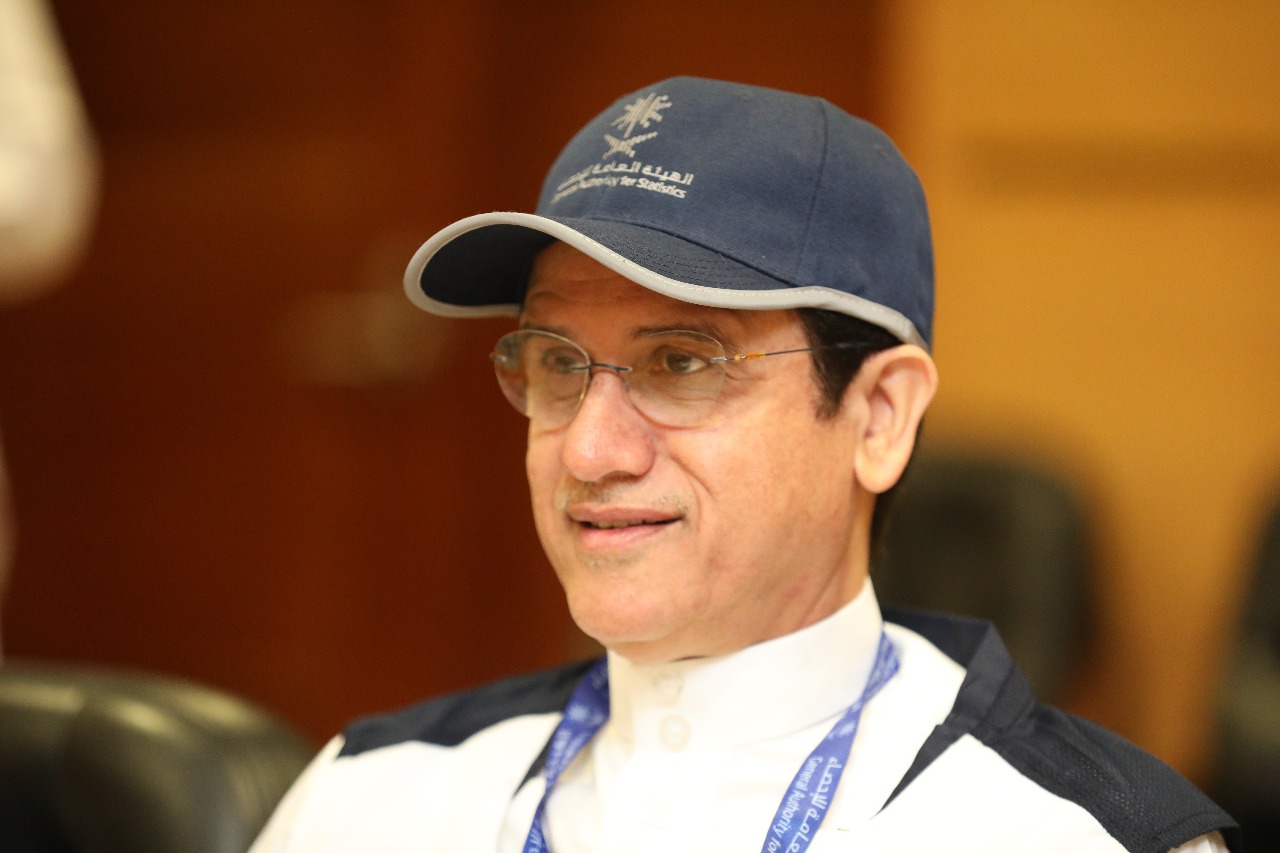GASTAT: The total number of pilgrims in 1439H Hajj season reached (2.371.675) pilgrims
20-08-2018
GASTAT: The total number of pilgrims in 1439H Hajj season reached (2.371.675) pilgrims
On Monday, the ninth of Dhu-Al-Hijjah, the General Authority for Statistics announced the results of 1439H Hajj statistics. The total number of pilgrims reached (2.371.675) pilgrims, (1.758.722) of whom came from outside Saudi Arabia, whereas (612.953) came from inside Saudi Arabia. However, the total number of male pilgrims reached (1.327.127) pilgrims, while female pilgrims reached (1.044.548) pilgrims.
With respect to the pilgrims arriving from outside Saudi Arabia, GCC pilgrims reached (34.140) pilgrims with (1.9) %, but the number of pilgrims from Arab countries apart from GCC pilgrims reached (395.410) pilgrims with (22.5) %, whereas the number of pilgrims from Asian countries apart from Arab countries reached (1.049.496) pilgrims with (59.7) %. In addition, the number of pilgrims from African countries apart from Arab countries reached (166.083) pilgrims with (9.5) %. However, the number of pilgrims from European countries reached (88.601) pilgrims with (5.0) %, whereas the number of pilgrims from North America, South America, and Australia reached (24.992) pilgrims with (1.4) %.
Moreover, (1.656.936) pilgrims who came from outside Saudi Arabia arrived through air ports, and (85.623) of whom arrived through land ports. However, (16.163) pilgrims arrived through sea ports.
Additionally, the pilgrims’ arrival to Saudi Arabia was at different periods of time. (557.282) of pilgrims coming from outside Saudi Arabia at the beginning of hajj until the 18th of Dhu AL-Qidah, and (744.903) of pilgrims arrived between 19-29 of Dhu AL-Qidah. Moreover, (456.537) of pilgrims continued to arrive to Saudi Arabia during the time period from 1 to 8 of Dhu AL-Hijjah.
Regarding the pilgrims who came from inside Saudi Arabia whose numbers reached (612.953) pilgrims this year, the total number of pilgrims arriving from the cities and governorates of Saudi Arabia reached (239.962), (372.991) of whom are from the city of Makkah including the temporary residents during the hajj season, (401.217) are Non-Saudi pilgrims, and (211.736) are Saudi pilgrims.
GASTAT has enumerated the pilgrims arriving to Makkah from inside Saudi Arabia (Saudis and Non-Saudis) through the hajj statistics centers located in the entrances of Makkah. In addition, the percentage of pilgrims arriving to Makkah from inside Saudi Arabia through Jeddah/Makkah road reached (38.2) %, (29.4) % arrived through AL-Shrae’a/Makkah road, and (17.8) % arrived through Makkah/Medina road. Moreover, (14.6) % arrived through the other three roads which are the South/Makkah road, Taif/Makkah road, and the old Jeddah/Makkah road.
GASTAT illustrated in its results of hajj statistics of this year that the seventh, eighth and ninth days of Dhu AL-Hijjah have witnessed an arrival reached (86.8) % out of the total number of pilgrims who came from inside Saudi Arabia. On the other hand, the number of vehicles carrying pilgrims from inside Saudi Arabia reached (32.289) vehicles.
As for the number of the labor force of entities that provided their services to pilgrims from all sectors, the numbers of governmental entities’ labor force reached more than 287.300 persons representing some governmental and private entities which participated in providing more than 215 main services and sub-services. Supervision and follow-up services were provided by 7310 male and female supervisors from 6 entities. However, public services were provided by 192.254 employees from 19 different entities, whereas health services were provided by 32.579 employees from 3 entities. Furthermore, the number of the labor force in transportation and post services, as well as logistic services (shipping, post and supply) that Saudi Arabia provides to pilgrims reached 47.765 employees working in seven entities, while ICT services were provided by 7.411 employees from 4 different entities.
On the other hand, his excellency the president of GASTAT, Dr.Fahad Altekhaifi thanked all the governmental security entities that supported GASTAT to implement its task in the hajj statistics of this year. He also praised the work of more than 450 statistical researchers who completed their assigned tasks for the hajj of this year after working 24/7 starting from the beginning of this month until the sunset of the day of Arafah.
Dr.Altekhaifi assured that all the details related to hajj statistics of the year 1439H have been published along with this announcement through the statistical hajj map and the detailed bulletin for hajj statistics which include more than (40) statistical outputs on GASTAT official website www.stats.gov.sa to provide accurate and detailed statistics, data and information about the number of pilgrims from inside and outside Saudi Arabia to help and support the concerned entities in their future planning programs for the purpose of ensuring the necessary services for pilgrims., including all social, health, security, food and transportation services by using time series of accurate data about the number of pilgrims, estimating the necessary labor force to serve the pilgrims and maintain their safety and comfort during the hajj season every year, examining the equipment and the main utilities in the city of Holy Makkah and its Holy places with taking that into consideration when preparing the necessary plans, in addition to supporting the researchers and beneficiaries who are interested in this field, evaluating the activities and the events arranged by the concerned entities of serving the pilgrims, and identifying the change in the way of arrival.
The statistical map and bulletin includes accurate and comprehensive data and information about the number of pilgrims according to the ways and dates of arrival. It also includes a number of main tables and charts such as: the number of pilgrims from inside Saudi Arabia according to gender and the way of arrival, the arrival of the Saudi pilgrims according to the way of arrival and nationality, comparing the number of the Non-Saudi pilgrims who came from inside Saudi Arabia in the years 1438H and 1439H by nationality, the number of vehicles carrying pilgrims who came from inside Saudi Arabia to the city of Makkah by vehicle type and the date of arrival, pilgrims from outside Saudi Arabia distributed according to gender and the way of arrival, pilgrims from outside Saudi Arabia distributed according to gender and the date of arrival, and comparing the numbers of pilgrims coming from outside in the years 1438H and 1439Haccording to the way of arrival.
By the end of the Hajj statistical works, GASTAT wishes that God accepts the pilgrims’ hajj and wishes success to all governmental and security entities and to other entities in Saudi Arabia to serve distinguished services and come out with a safe and distinct hajj season.



